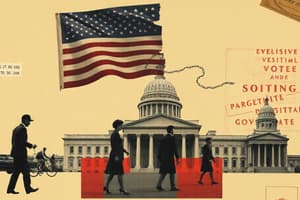Podcast
Questions and Answers
What was a primary requirement for voters in 1776?
What was a primary requirement for voters in 1776?
- Having a university degree
- Being a wealthy, land-owning male (correct)
- Being a freeholder of any amount of land
- Being a native-born citizen
How many eligible voters were there in the election of 1800?
How many eligible voters were there in the election of 1800?
- 1 million
- 500,000
- 22,000 (correct)
- 100,000
Which significant event in voting rights occurred after the Civil War?
Which significant event in voting rights occurred after the Civil War?
- Black men were allowed to vote (correct)
- Native Americans were granted full citizenship rights
- Women gained the right to vote in all election levels
- Voting rights were restricted to white males only
What aspect of voting rights changed over time according to historical context?
What aspect of voting rights changed over time according to historical context?
What can be inferred about the influence of wealthy landowners on voting rights?
What can be inferred about the influence of wealthy landowners on voting rights?
Flashcards
Voter Eligibility in 1776
Voter Eligibility in 1776
In 1776, only wealthy, land-owning men could vote. This was a common requirement in early America.
Limited Voter Power
Limited Voter Power
The power of the public was limited in early America because only a small percentage of the population could vote.
Expansion of Voting Rights
Expansion of Voting Rights
As the 19th century progressed, voting rights expanded. This change was primarily linked to state constitutions.
Women's Voting Rights in 1776+
Women's Voting Rights in 1776+
Signup and view all the flashcards
Changing Voting Rights
Changing Voting Rights
Signup and view all the flashcards
Study Notes
Voter Eligibility in 1776
- Voter eligibility in 1776 heavily restricted.
- Primarily land-owning, wealthy males were eligible.
- Land ownership was a key requirement.
- This system was not permanent and would evolve.
Historical Context of Voting Rights
- 19th century saw expansion of voting rights, but governed by state constitutions.
- Some women could vote in state and local elections, but not federal elections (prior to 1920).
- Black men gained voting rights after the Civil War, but not women.
- Voting eligibility depended on state laws and land ownership.
Election of 1800
- Only about 22,000 voters participated in the 1800 election amidst a population of 2.5 million.
- The limitation of eligible voters stemmed from land-ownership requirements.
- Voter engagement was restricted, limiting public influence on government.
Voting Power & Laws
- Voting rights and related laws evolved significantly.
- Power structure favored wealthy landowners who resisted losing their influence.
- The history of voting rights is a dynamic and varied aspect of American history.
Studying That Suits You
Use AI to generate personalized quizzes and flashcards to suit your learning preferences.




